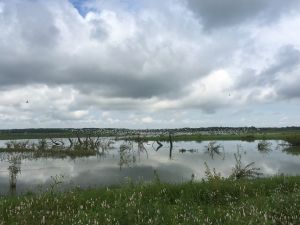
A study to determine the influence of wetland soil saturation period on clothianidin decomposition in soils of different textures collected from a variety of MDC intensively managed wetlands.
Neonicotinoids are a class of broad-spectrum systemic insecticides frequently used in agroecosystems to control root and leaf eating pests. The widespread use and environmental persistence of neonicotinoids in the U.S. and globally has resulted in widespread surface water contamination and build-up of neonicotinoids within other environmental sectors, such as soils and wetlands. Due to the deleterious effects of neonicotinoids on non-target insects and wildlife, it is necessary to evaluate management practices that can (1) reduce neonicotinoid entry into surface waters hydrologically connected to natural and managed wetlands and (2) accelerate neonicotinoid decomposition within intensively managed wetlands during the spring when expected peak neonicotinoid concentrations coincide with crop planting.
Scientific literature suggests that anoxic soil conditions (i.e., absence of oxygen) can enhance neonicotinoid decomposition. This suggests that maintaining saturated soil conditions within intensively managed wetlands through the spring crop planting period may accelerate neonicotinoid degradation in wetland soils.
The objectives of this project was to: determine the influence of wetland soil saturation period on clothianidin decomposition in soils of different textures collected from a variety of MDC intensively managed wetlands.
